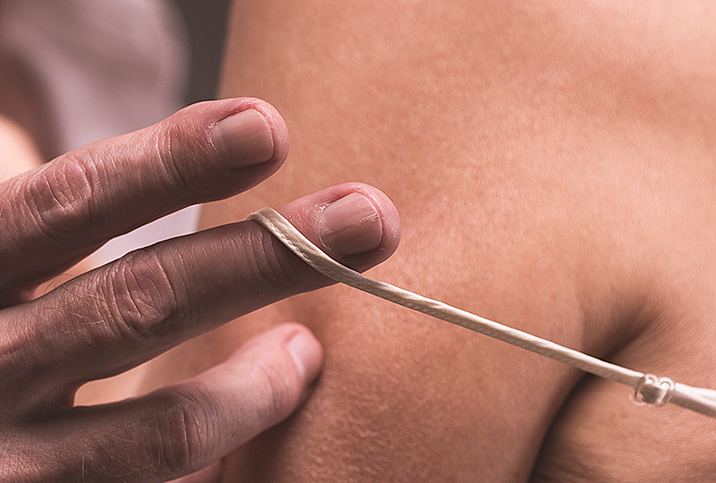New Research Suggests a Pill Can Prevent STIs—But Does It Work?

Key Points
- Doxycycline, a long-standing antibiotic, is being repurposed as a preventive tool against bacterial sexually transmitted infections.
- This medication has not been shown to be effective for cisgender women and does not protect against viral STIs such as herpes or HIV.
- Despite concerns about antimicrobial resistance, no current data suggests that doxycycline contributes to drug-resistant superbugs.
Doxycycline, an inexpensive, widely available antibiotic, has been used to treat bacterial infections since the 1960s. But now, the decades-old medication is being assigned a new purpose: a tool to prevent bacterial sexually transmitted infections (STIs).
Already established as a potential treatment for such sexually transmitted diseases (STDs) as chlamydia, syphilis and gonorrhea, doxycycline may be effective in preventing those STDs, too, according to new evidence.
When used preventively, doxycycline functions as a "morning-after" pill for sex, according to Jeffrey D. Klausner, M.D., a professor of clinical population and health sciences at the University of Southern California in Los Angeles.
"Several studies across Europe and the United States have all shown around a 70 percent reduction in new bacterial STIs among [men and transgender women] who take it every day or within 72 hours after sex," Klausner said.
Using doxycycline preventively is called doxycycline post-exposure prophylaxis or "doxyPEP."
This new STD and STI prevention method emerges amid a recent surge in syphilis, gonorrhea and chlamydia cases, according to the Centers for Disease Control and Prevention (CDC).
Klausner, who has been researching doxycycline for STI prevention since 2011, said he hopes doxyPEP can play a role in curbing the spike.
"We're very excited about what could be a real breakthrough in our efforts to prevent and control bacterial sexually transmitted infections," he added.
How does doxyPEP work?
The doxPEP approach involves taking a dose of the antibiotic doxycycline within 24 hours—no later than 72 hours—following condomless sex, according to Manik Kohli, M.B.Ch.B., a clinical research fellow in sexual health, HIV and infectious diseases at the University College London.
DoxyPEP has been shown to reduce the transmission risk of the bacterial STDs chlamydia, syphilis and gonorrhea for gay and bisexual men and transgender women, he noted. Specifically, doxyPEP cut the risk of gonorrhea by about 55 percent to 60 percent, and the risk of chlamydia and syphilis by about 80 percent, according to a 2022 study.
Importantly, doxyPEP has not been confirmed to work in people who have vaginal receptive sex and is not recommended for cisgender women. In addition, doxyPEP doesn't prevent viral sexually transmitted infections such as Mpox, herpes or HIV.
Recommended
- Can Gonorrhea Give You Arthritis?: In rare cases, if untreated, gonorrhea can spread and infect other body parts.
- Swiping Right to Track Sexually Transmitted Infections: Public health nurses are successfully using dating apps to find people who may have STIs.
- If Your Partner Seems Too Perfect, They May Be Catfishing You With AI: Artificial intelligence can help your dating life, but here's what you have to watch out for.
Why doesn't doxyPEP work for cisgender women?
So far, doxyPEP has only been shown to reduce bacterial STI transmission in people assigned male at birth. There is currently limited research about the efficacy of doxyPEP in preventing sexually transmitted infections in cisgender females, Klausner said.
One of the few trials investigating the efficacy of doxyPEP on females was performed in 2023 with more than 400 cisgender women participants in Kenya. Findings indicated the treatment did not significantly reduce their risk of STIs.
However, the study data suggested many participants did not take the doxycycline as prescribed, according to Klausner. He said he remains optimistic that repeat studies will demonstrate the doxyPEP's efficacy in preventing STIs in females.
"Doxycycline works to treat a variety of infectious diseases in females," he added. "Biologically, there's no reason why doxyPEP wouldn't work in women."
What are the risks of doxyPep?
One of the most commonly cited risks of using doxycycline to prevent STIs is the possibility of fueling antimicrobial resistance.
Antimicrobial resistance occurs when germs evolve into "superbugs" that evade the drugs designed to kill them. The potential for breeding antibiotic-resistant bacteria is considered a top global public health threat by the World Health Organization (WHO).
However, Klausner hasn't seen any data suggesting doxycycline will facilitate the evolution of drug-resistant superbugs.
"In the 70 years of doxycycline use, neither syphilis nor chlamydia have developed any resistance to tetracyclines like doxycycline," he said.
As with evaluating any medicine, it's important to consider both the benefits and risks of taking doxyPEP versus not taking it.
"It comes down to risk-benefit," Klausner said. "There's the known benefit of taking doxycycline after sex to reduce the risk of getting STIs versus the theoretical risk of generating antibiotic resistance."
Kohli agreed, adding that, for him, the consequences of STDs such as syphilis outweigh the potential threat, and there are ways to monitor the issue and mitigate risk.
"As the evidence grows in terms of how effective doxyPEP is in STI prevention, I think the weight behind using it will grow as well," he said.
Klausner remains hopeful we will develop vaccines in the near future to combat STDs and STIs.
"When we have a gonorrhea vaccine, a chlamydia vaccine and eventually a syphilis vaccine, they will be the safest and most effective way to prevent bacterial STDs, rendering prevention intervention unnecessary," he said.
Oral Sex Can Lead to STDs in Your Mouth, Throat, Lips and Tongue: Using your tongue for pleasure can put you at risk for syphilis, gonorrhea and hepatitis A and B. There are ways to continue having oral sex while significantly decreasing your chances of passing or getting an STD. Find out how.
What are the side effects of doxyPEP?
"Generally, doxycycline is considered a very safe, well-tolerated medication that's used all over the world," Klausner said.
However, like all antibiotics, doxycycline has the potential to cause side effects, according to Kohli.
"Common side effects include stomach upset and nausea reflux," he said. "People can also sometimes get sensitivity to the sun if they're taking it for long periods of time."
To minimize these potential side effects, people who take doxycycline are advised to take the medication on a full stomach and use sunscreen, Klausner explained. A rare, third complication occurs if the pill gets stuck in the food pipe.
"If that happens, it can irritate the food pipe and cause an ulcer," he said. "That's why we recommend people take it at least a half hour before bed and with a full glass of water."
How to get doxyPEP
Currently, doxyPEP is an off-label medication, as the U.S. Food and Drug Administration (FDA) has not approved it for STI post-exposure prophylaxis and the CDC has not released official guidance.
Even though its STI prevention use has not been officially approved, doxycycline is available via prescription in the U.S. and all over the world. You can get a prescription for doxycycline from a healthcare provider and at sexual health clinics.
What you should know before taking doxyPEP
When relying on doxycycline for STI prevention, Kohli said it's really important to take doxycycline exactly as advised: 200 milligrams no later than 72 hours after condomless sex.
Before using the medication, Klausner recommended getting a checkup and an STI test. You should be aware if you have any conditions that make it unsafe to take doxycycline, such as severe kidney or liver disease. Even if you are taking doxyPEP, you should still seek STI checks and use condoms—particularly when you have a new sexual partner.
"Doxycycline doesn't prevent every STI, so condoms are still the most effective way to prevent their spread," Klausner said.


















